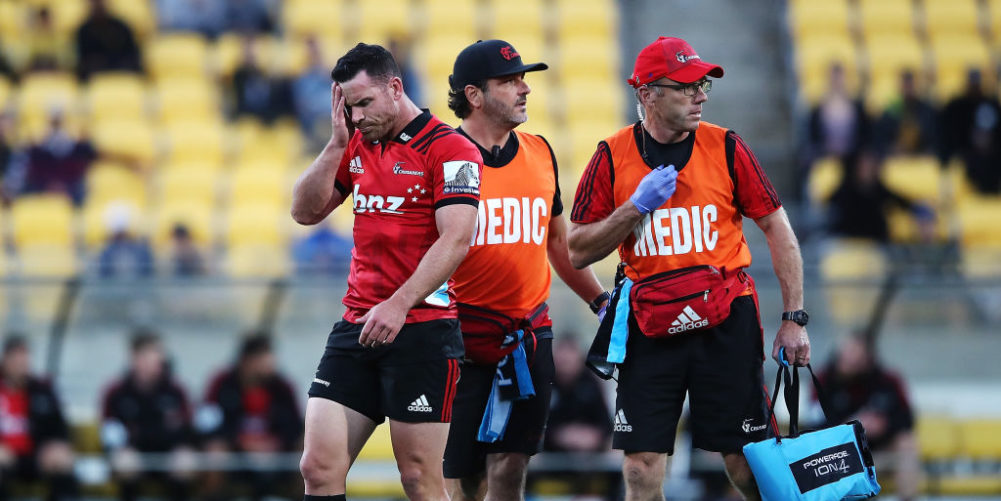World Rugby is being urged to give victims of head injuries greater protection from more serious damage by imposing a minimum 21-day recovery period.
The lobby group, whose medical experts have campaigned on player-welfare issues for almost 18 months, welcome the governing body’s decision to double the stand-down period from six to 12 days but claim it is nowhere near long enough.
They believe a 28-day stand-down would be the ideal solution. They are also angered that the new 12-day concussion protocol effective from Wednesday will not apply to all players, leaving up to 15 per cent expected to return without missing a match.
Progressive Rugby, whose members include eminent specialists in professors John Fairclough and Bill Ribbands as well as World Cup winner Kyran Bracken, make their stand on a weekend which revealed the desperate plight of former All Black prop Carl Hayman.
In a harrowing interview, his partner, Kiko Matthews, told The Guardian: “Carl will say – and I totally get where he’s coming from: ‘What’s the point in living?
“It’s only going to get worse. I’ve got headaches every day. I can’t function. And this is as good as it’s going to get. There is no cure.”
One of several international players to be diagnosed with dementia, Hayman is taking legal action along with others including England‘s World Cup-winning hooker Steve Thompson and former Wales back row forward Alix Popham.
Progressive Rugby, not part of that action having preferred to work with World Rugby, told The Rugby Paper: “Whilst long overdue and not the perfect solution, increasing the stand-down period to 12 days is a positive step.
“It will prevent most elite players from being exposed to extreme and unnecessary risk but it does not go nearly far enough.
“Our expert view is that victims of brain injury should not be allowed to return for 28 days. We base that on evidence from concussion experts and neuroscientists across the rugby world.

“We remain disappointed that the new regulations will allow some players to return in just seven days.
“We maintain our position on the crucial issue of ensuring that contact training guidelines comply with the new protocols.”
“Most crucially of all, it means that there can be no repeat of distressing on-field scenarios as reported in The Rugby Paper, like the one involving Luke Cowan-Dickie: knocked out and then cleared to play for the Lions in South Africa seven days later.”
Bracken described that as a “stain on our great game”.
Progressive Rugby added: “The HIA has been shown not to be fit for purpose on occasions. The Welsh prop, Tomas Francis, being knocked out during the England match at Twickenham in February and then being allowed to remain on the pitch is a shocking example.
“The idea that these type of incidents are now consigned to history is something we are incredibly proud to have brought about.
“There is a long way to go but this gives significant impetus to keep working hard to protect the players and the game.”
Any player with a history of head injuries who has been withdrawn from a match because of ‘obvious concussion symptoms’ cannot play for a minimum of twelve days.
But players with no record of concussion who pass a Head Injury Assessment will be clear to return after seven days, subject to independent approval from a concussion consultant.
The recommendations, made by World Rugby’s independent concussion working group, will take effect from Wednesday.
Dr Bob Cantu, a member of the independent concussion working group, claims that World Rugby’s HIA protocol is ‘gold standard, second to none and superior to most’.
“The Concussion Working Group will continue to monitor scientific and expert consensus as well as World Rugby’s new head injury data,” he said. “If and when the science suggests changes to protocols, recommendations will be made to World Rugby as this, like science, is a dynamic ongoing process.”
Progressive Rugby are less than convinced. “The ‘gold standard’ claim may make a good headline but, in truth, it’s more reflective of how low the bar has been set in other sports,” they say.
“There is still plenty of work to do and we shall not rest until it is done to ensure that the great game of rugby can be enjoyed by future generations.”
For more exclusive stories and all the detailed rugby news you need, subscribe to The Rugby Paper website, digital edition, or newspaper from as little as 14p a day.























